Horse Racing trivia
On December 29, 1945, the record for the slowest time for a winning horse was set by Never Mind II. During a 2-mi. steeplechase, Never Mind II refused the 4th jump and his rider gave up and returned to the paddock. Then the rider was told that all the other horses had fallen or been disqualified. Immediately he "raced" Never Mind II back to the field and finished in 11 minutes 28 seconds (normal time is around 4 minutes).
Jockey Eddie Arcaro rode 250 losers before he finally won his 1st race. After that, for most of his 31 years in the saddle, he seemed never to stop winning. Before his retirement in 1961, Arcaro won 4,779 races, including 5 victories in the Kentucky Derby, 6 in the Preakness Stakes, and 6 in the Belmont Stakes. He rode Whirlaway and Citation to Triple Crown championships, and guided the inimitable Kelso to numerous victories.
In 1831, Squire George Osbaldeston rode 200 mi. in 8 hours 39 minutes. Osbaldeston used 20 horses. His speed/distance record still stands.
History's greatest breeder was Darius of Persia (522-485 B.C.), who had more than 50,000 brood mares. Darius's horses were half the size of today's.
Kincsem, a Hungarian mare, was unbeaten in 54 races (1877-1880) and holds the world's record for best win-lose percentage.
The 1st public racetrack was built in 1174 and named the Smithfield Track of London.
The owners of the speedstar, Alsab, made one of the finest deals in history. The horse they bought for $700 earned $350,015 during its career.
Foaled in 1888, Logan ran 388 races--a record number of starts--and won 76.
Kingston made 74 starts and never finished out of the money.
Rubio, a retired racehorse who had been pulling a farm plow for 3 years, won the 1908 Grand National Steeplechase in England. With 66-1 odds against him, Rubio netted his owner, Major F. Douglas-Pennant, a prize sum of $12,000.
The Tetrarch, called by many Englishmen the fastest horse of all time, was so swift that he couldn't control his legs. His hind hooves cut and bruised the fetlocks and shins of his front legs. At the end of his 2-year-old season in 1913, during which he was undefeated, The Tetrarch had to retire because his legs were so badly damaged.
In 1904, Moifaa was being shipped from Australia to England to compete in the Grand National Steeplechase when the ship was wrecked. The thoroughbred, given up for dead by owners and crew, swam to an island where he was found by fishermen. They returned Moifaa to his trainer in time to be reconditioned, to enter the big race, and to win it against 25-1 odds.
Jockey Levi Barlingume, rode until 1932 when, at age 80, he fell and broke his leg at Stafford, Kans., thus ending the longest recorded career of any jockey.
A 40-1 longshot, Nickel Coin, won the Grand National Steeplechase in 1951 after being trained on a diet of duck eggs and beer.
Kitchner was the lightest winning jockey in history. He weighed in at 49 lbs. when he rode Red Deer, winner of the 1844 Chester Cup in England. It is said that Kitchner weighed only 40 lbs. in 1840.
Over a period of 3 days in October, 1933, Gordon Richards rode 12 straight winners. He accomplished the feat in England.
Every thoroughbred race horse in the world is a descendant of one of 3 horses which were imported to England in the 18th century: Byerly Turk, Darley Arabian, or Godolphin Barb.
Steve Donoghue rode 108 consecutive losers, yet also won 3 consecutive English Derbys.
The 1929 Grand National Steeplechase had 66 starters, the record for the most horses participating in one race.
The skeleton of the oldest known horse is estimated to be 45 million years old.
In order to make the required weight for a race, jockey Alfred Johnson lost 14 lbs. in one day.
Horse Racing Spotlight
- THE TRIPLE CROWN This is the pinnacle of horse racing achievements. It requires winning three of the biggest stakes races in the world, all within a five-week stretch that starts on the first Saturday of May.
- THE KENTUCKY DERBY This is the first jewel of the Triple Crown. It is staged at Churchill Downs in Louisville, Kentucky on the first Saturday in May, capping the two-week-long Kentucky Derby Festival.
- THE PREAKNESS STAKES This the middle jewel of the Triple Crown. It was conceived through an agreement among sportsmen to stage a special race to commemorate a memorable occasion on a late summer evening in 1868.
- THE BELMONT STAKES This is the third jewel of the Triple Crown. It is held five weeks after the Kentucky Derby at Belmont Park in Elmont, New York.
- THE BREEDERS' CUP This is a one-day event held at a location that changes each year. All the sites have been in the United States, except in 1996, when the races were held at Woodbine Racetrack in Canada.

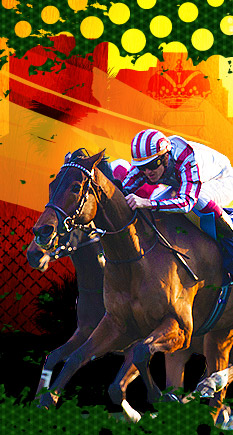
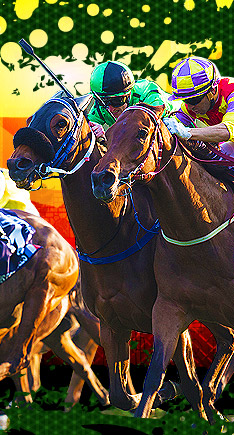
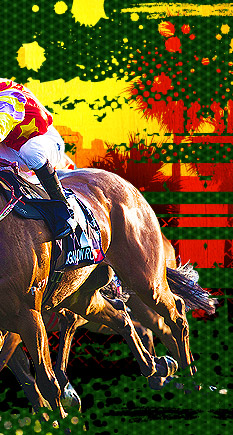
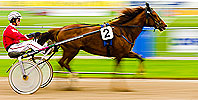 Harness Racing Generally speaking, the inside post positions (numbers one through four) are an advantage, especially on half-mile tracks.
Harness Racing Generally speaking, the inside post positions (numbers one through four) are an advantage, especially on half-mile tracks.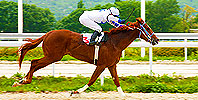 Thoroughbred Racing "Pace makes the race." This old racing expression points to another element to consider when placing your bets -- the pace of the race.
Thoroughbred Racing "Pace makes the race." This old racing expression points to another element to consider when placing your bets -- the pace of the race.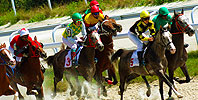 Quarter Horse Racing Straightaway American Quarter Horse racing is an all-out burst of speed from the starting gate with every horse trying to put a head in front at the finish.
Quarter Horse Racing Straightaway American Quarter Horse racing is an all-out burst of speed from the starting gate with every horse trying to put a head in front at the finish.
